Business Fundamentals
The Anti-Elevator Pitch: How to Build Authentic Business Connections Without the Hard Sell
10.02.2025
By Shaikh Asif

Business Fundamentals
10.02.2025
By Shaikh Asif
Ever been told to master your elevator pitch? In 30 seconds, you're expected to sell yourself, your business, and your brand all in one tidy, rehearsed package. But here's the thing: most elevator pitches miss the mark. They feel too salesy, too focused on pushing a product or service instead of fostering a real connection. That's where the Anti-Elevator Pitch comes in.
Unlike the traditional pitch, the Anti-Elevator Pitch isn't about selling—it’s about connecting. It's about leading with empathy and curiosity, positioning yourself as a listener rather than a salesperson. And in today’s business landscape, especially for startups, entrepreneurs, and creative professionals, this approach is a game-changer.
At Alitestar, we believe that branding is about more than just logos and taglines—it’s about creating genuine relationships. Our expertise in brand strategy, brand identity design, storytelling, and logo creation is built around helping businesses communicate authentically. In this article, we'll explore how the Anti-Elevator Pitch can reshape how you connect with clients and partners, and how it ties into building a memorable and impactful brand.
The Anti-Elevator Pitch is a direct response to the shortcomings of the classic elevator pitch. Rather than delivering a polished 30-second sales pitch, the Anti-Elevator Pitch focuses on starting a conversation, building trust, and genuinely engaging with your audience. Think of it as an opportunity to listen first, speak second.
For instance, let’s say you're meeting a potential client. Instead of immediately jumping into what services you provide or why you're the best at what you do, the Anti-Elevator Pitch might sound something like: "I help businesses connect with their audience on an emotional level through powerful branding. What's been your biggest challenge in building your brand?"
This approach encourages dialogue rather than monologue. It invites the other person to share their needs and challenges, creating an organic entry point for your expertise. It's less about impressing them with your credentials and more about engaging in a meaningful way.
In a world that values authenticity more than ever, especially in the creative and business sectors, this shift in approach is both timely and effective.
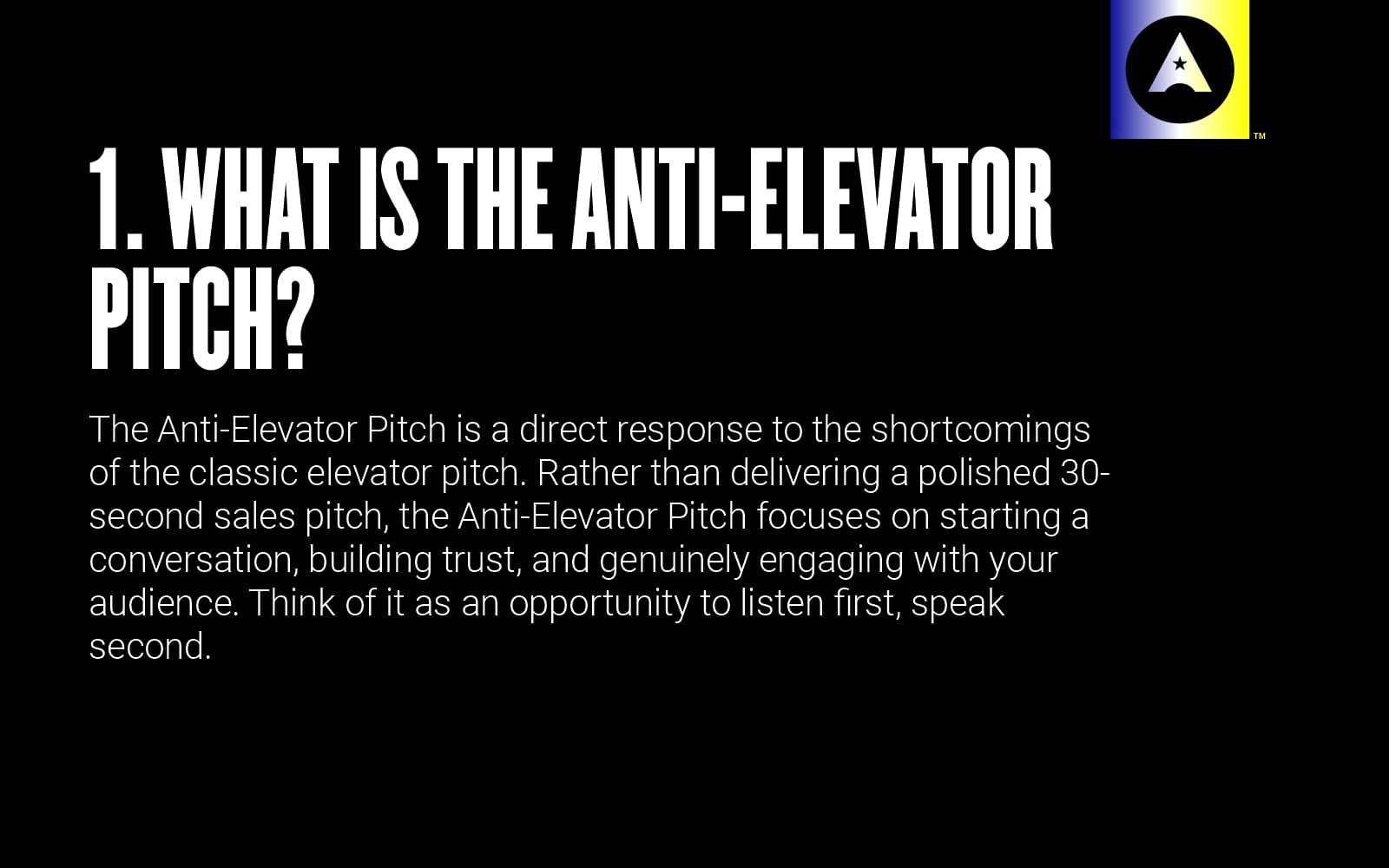
Ready to put the Anti-Elevator Pitch to work? Here’s a practical, step-by-step guide on how to craft and use it effectively in your interactions:
Start with curiosity: Open the conversation with a question that centers around your audience’s needs. For example, if you’re speaking with a startup founder, you might ask: “What’s been the most difficult part of getting your brand’s message across?” This shifts the focus to them, creating an immediate connection.
Listen before speaking: The key to the Anti-Elevator Pitch is listening. Pay close attention to their responses. The more you understand their challenges, the better you can frame your value in a way that resonates with them.
Focus on their pain points, not your solution: Avoid launching into a sales pitch. Instead, express how you can help with what they’re struggling with. If they mention trouble with brand consistency, you might say: “I’ve worked with companies in your industry to develop cohesive brand identities that improve customer trust. What have you tried so far?”
Tell a story, not a pitch: People remember stories more than facts and figures. Share a brief, relevant story about how you've helped another client. At Alitestar, we’ve helped countless startups find their voice through brand storytelling and visual identity. A story like this can give context to your expertise without feeling like a sales push.
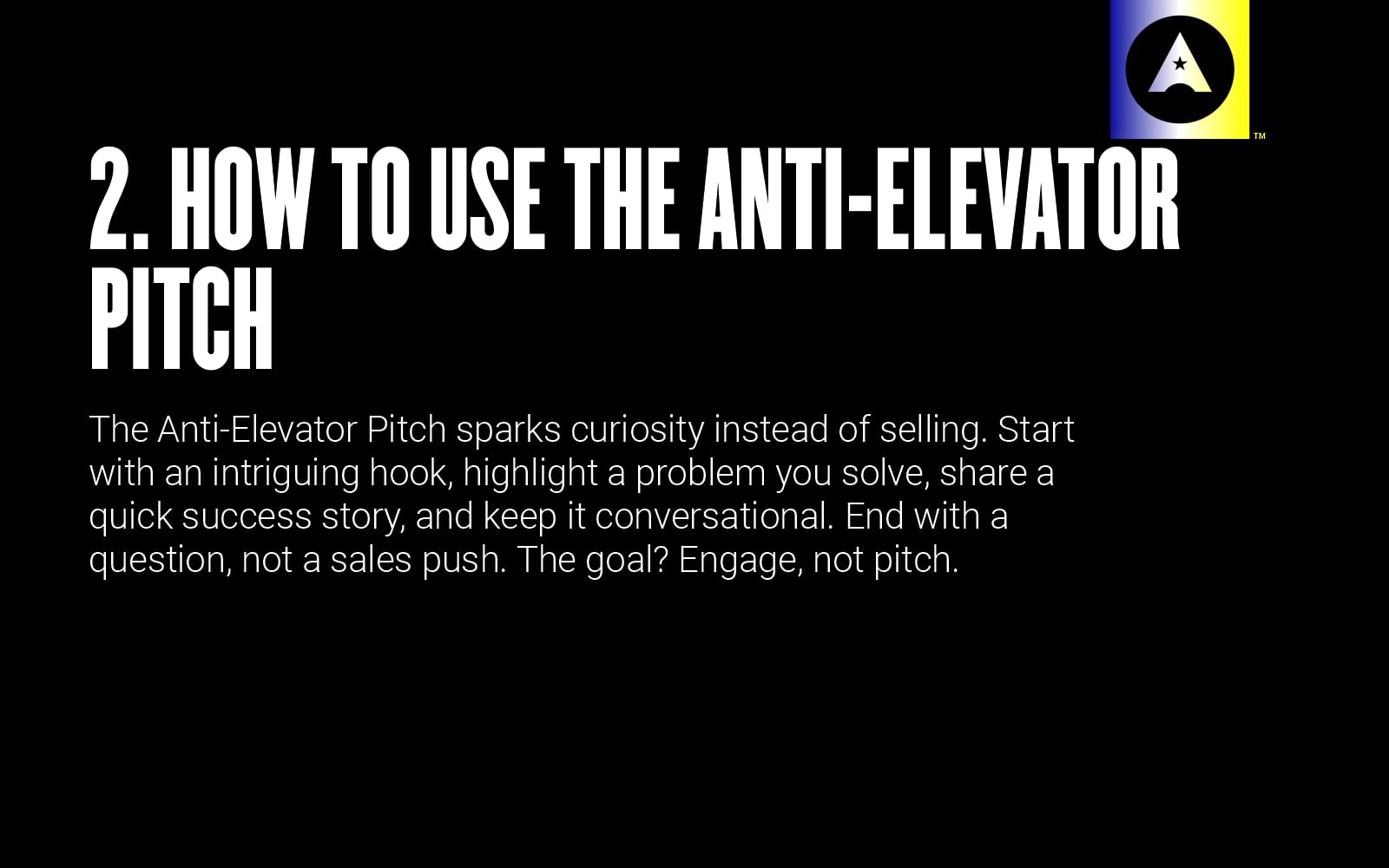
At its core, the Anti-Elevator Pitch serves one major purpose: to build authentic connections that lead to lasting relationships.
In today’s world, consumers and business partners alike are more discerning. They value trust and emotional connection over flashy sales tactics. That’s why the Anti-Elevator Pitch works. It differentiates you from the competition by showing that you're not just trying to make a sale—you’re genuinely invested in understanding and solving their problems.
For businesses, especially startups and entrepreneurs, the Anti-Elevator Pitch sets a foundation for long-term partnerships. It’s not about winning them over in 30 seconds but about starting a conversation that leads to collaboration.
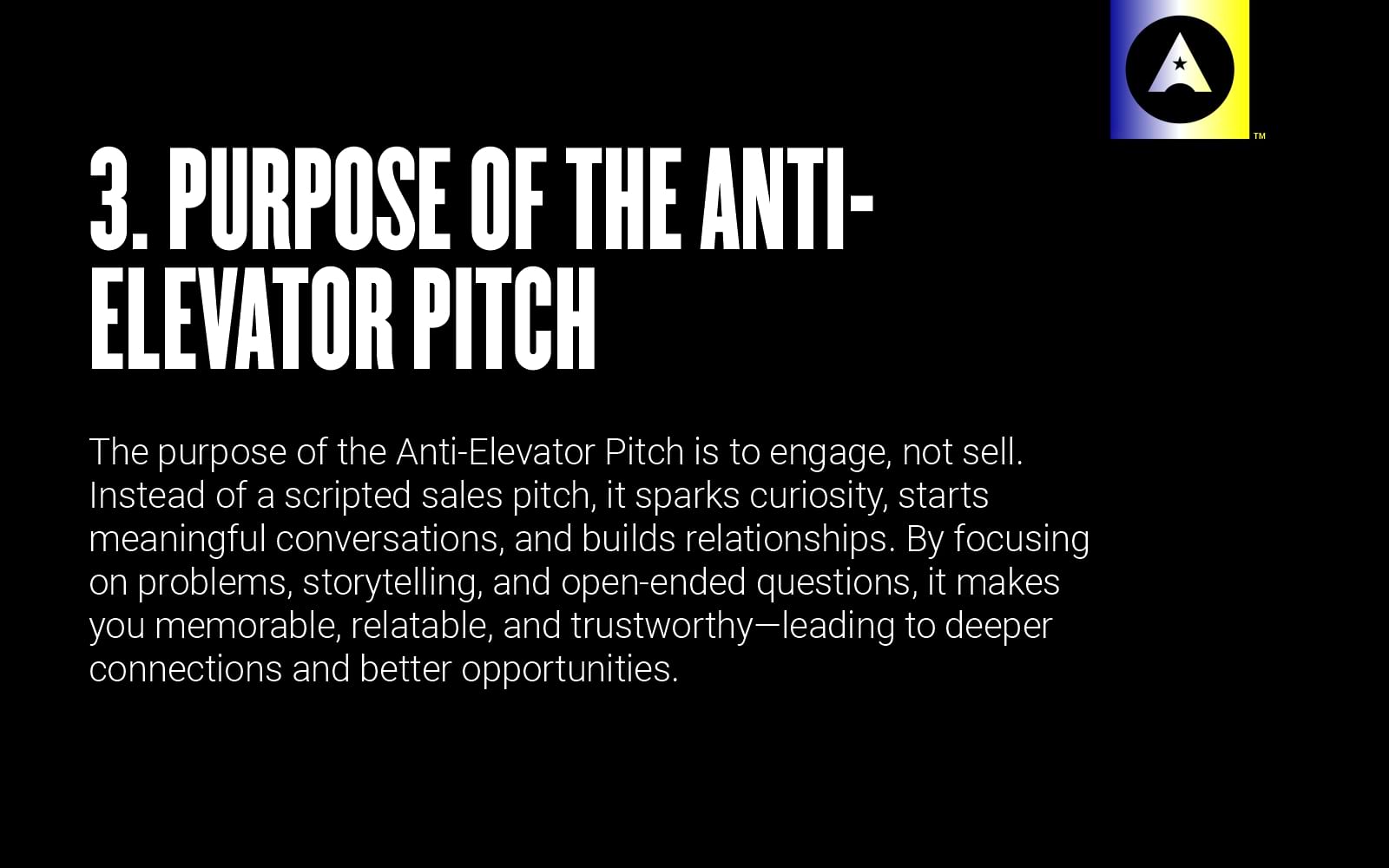
What sets the Anti-Elevator Pitch apart from traditional sales approaches is that it’s tailored for today’s customer-driven, relationship-first marketplace. Here are the key benefits of adopting this approach:
Authenticity: People are tired of being “sold to.” By focusing on conversation rather than conversion, you come across as more genuine. This is crucial for creative professionals and business owners trying to build meaningful connections.
Trust-Building: When you take the time to listen, you build trust. And trust is the cornerstone of any successful relationship—whether it’s with a client, partner, or investor. An authentic approach naturally leads to better business outcomes.
Long-Term Relationships: Instead of a one-time sale, the Anti-Elevator Pitch encourages ongoing partnerships. When your approach is rooted in empathy and curiosity, you're more likely to create loyal, long-term clients who feel connected to your brand.
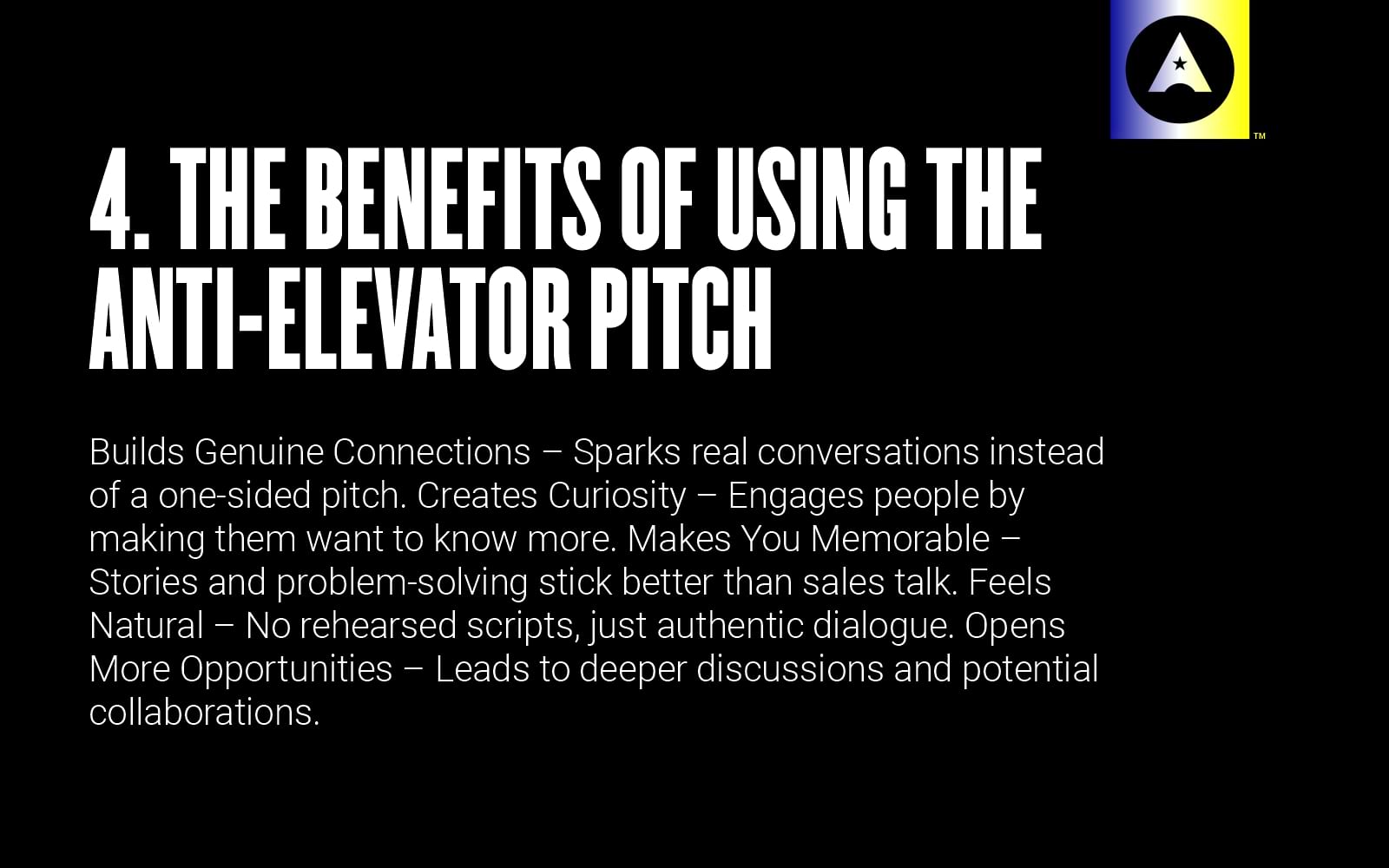
Creating your Anti-Elevator Pitch is about understanding your audience, being authentic, and staying open to dialogue. Here’s a simple process to craft yours:
Understand your audience: Before you even begin the conversation, know who you're speaking to. What industry are they in? What challenges are they likely facing? For instance, a startup in need of brand strategy will have very different needs from an established company looking for a logo redesign.
Keep it concise but open-ended: The goal isn't to cram as much information into 30 seconds as possible. Instead, keep your initial conversation short and to the point, but leave room for the other person to respond.
Highlight your unique value subtly: While you're not overtly selling, you should still hint at what makes your approach special. At Alitestar, we emphasize our expertise in brand identity, storytelling, and strategy to let our audience know we’re about more than just design—we’re about building meaningful connections.
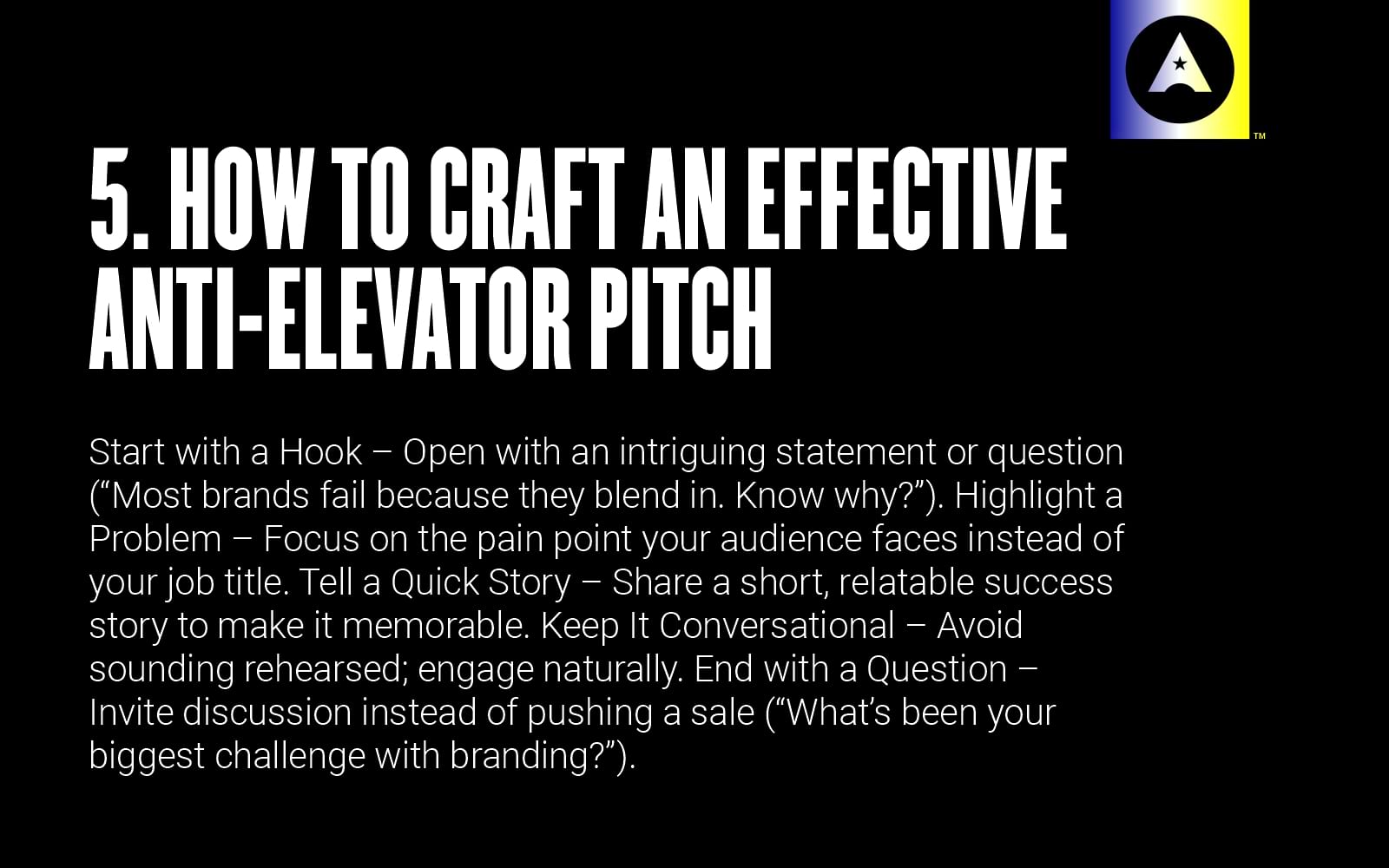
At Alitestar, we believe that a brand isn’t just about visuals—it’s about storytelling, connection, and trust. And that’s why the Anti-Elevator Pitch aligns perfectly with our approach to brand strategy and design.
Whether you’re a creative professional, an entrepreneur launching a startup, or a business leader looking to refresh your brand, we can help you craft a brand story that resonates deeply with your audience. Our services in brand naming, identity design, storytelling, and brand guidelines ensure that your brand stands out not just visually, but emotionally.
If you're ready to elevate your brand and create connections that last, let’s start the conversation.
The Anti-Elevator Pitch isn’t just a new way to communicate—it’s a new way to build relationships. It allows you to connect on a deeper level, show empathy, and build trust—all while staying authentic to your brand.
At Alitestar, we help businesses like yours craft compelling brand stories and identities that resonate with your audience. From logo design to brand strategy, our team is here to guide you every step of the way. Ready to stand out without selling out? Let’s work together to create a brand that speaks for itself.


Shaikh Asif is an Award-winning designer, director, strategist, and educator. He’s the Lead Strategic Brand Designer and Art Director of The Alitestar— a strategic branding and design agency that helps startups, ambitious CEOs, and passionate entrepreneurs to achieve success and ultimately create unforgettable brand experiences.